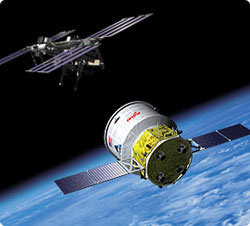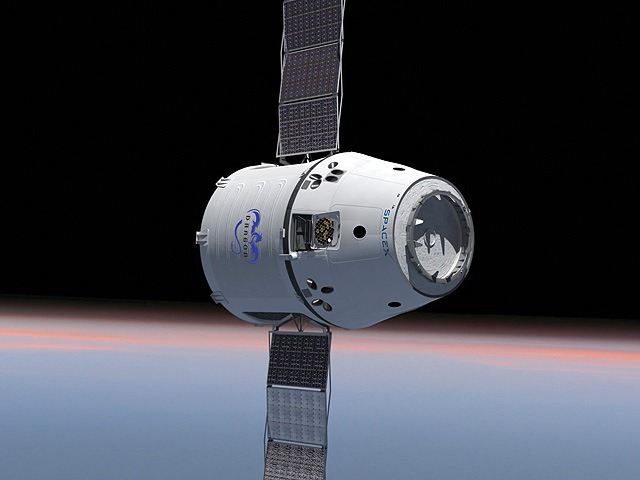[/caption]
Two upstart commercial space companies have been awarded contracts by NASA for commercial cargo resupply services to the International Space Station. SpaceX, also known as Space Exploration Technologies received a contract for $1.6 billion while Orbital Sciences Corp. of Dulles, Va. has a contract valued at $1.9 billion. NASA has ordered 12 flights from SpaceX and eight from Orbital. In October, at this year’s International Symposium for Personal and Commercial Spaceflight, SpaceX Vice President of Marketing and Communications Diane Murphy said that the six- year-old company has it in their sights to be able to fly to the space station by 2009. For now, the contract is for cargo only, however SpaceX’s Dragon capsule and Falcon 9 rocket are human rated, and would be capable of delivering up to 7 crew members to the station. The Dragon could also be used as an escape vehicle. If SpaceX and Orbital can be successful in cargo re-supply, it could pave the way for a potential solution to the gap between the shuttle retirement in 2010 and when the Constellation program would be ready to fly, hopefully by 2015.
“The SpaceX team is honored to have been selected by NASA as the winner of the Cargo Resupply Services contract,” said Elon Musk, CEO and CTO, SpaceX. “This is a tremendous responsibility, given the swiftly approaching retirement of the Space Shuttle and the significant future needs of the Space Station. This also demonstrates the success of the NASA COTS program, which has opened a new era for NASA in US Commercial spaceflight.”

“We are very appreciative of the trust NASA has placed with us to provide commercial cargo transportation services to and from the International Space Station, beginning with our demonstration flight scheduled in late 2010,” said Mr. David W. Thompson, Orbital’s Chairman and Chief Executive Officer. “The CRS program will serve as a showcase for the types of commercial services U.S. space companies can offer NASA, allowing the space agency to devote a greater proportion of its resources for the challenges of human spaceflight, deep space exploration and scientific investigations of our planet and the universe in which we live.”
Orbital will use their module called Cygnus to deliver cargo, launched on their Taurus rocket.
These fixed-price indefinite delivery, indefinite quantity contracts will begin Jan. 1, 2009, and are effective through Dec. 31, 2016. The contracts each call for the delivery of a minimum of 20 metric tons of upmass cargo to the space station. The contracts also call for delivery of non-standard services in support of the cargo resupply, including analysis and special tasks as the government determines are necessary.
NASA has set production milestones and reviews on the contracts to monitor progress toward providing services. The maximum potential value of each contract is about $3.1 billion. Based on known requirements, the value of both contracts combined is projected at $3.5 billion.
These agreements do fulfill NASA’s need to for cargo delivery to the space station after the retirement of the space shuttle.


I’m of two minds about this. I couldn’t be happier for SpaceX and Orbital. I’m glad that private firms have gotten to the point where they can start to take a fraction of the space exploration pie.
However, isn’t this exactly how once productive companies like Lockheed and Grumman became the static giants that they are today? I may be wrong, but I almost feel that companies like SpaceX and Orbital will do better if they aren’t spoiled the way that these other aerospace corps were in the 60’s and 70’s.
First glance, this seems tremendously exciting. But something is wrong. SpaceX is planning on flying to the station in 2009!?!.
Have they flown a mission anywhere yet? And yet not only do they plan on being ready to fly to the station in 2009, we are going to see NASA giving them permission to even approach the station, let alone link up?
I’m not suggesting free enterprise cannot do something as well or as safely as NASA. In fact, I fully expect them to surpass NASA in both areas. Eventually.
It’s just the time frame that seems wacky.
The contract starts from 1 Jan 2009. That does not mean there will be any flights just yet.
I’ll have to check on the details but COTS ( http://www.alliancespace.net/cots/ ) mission must partly include the safety aspects of commercial launchers docking at the ISS. These craft would not be let anywhere near the ISS unless they have been through the entire gamut of safety checks. This has been true since the Challenger Disaster. So to mention an “inevitable disaster” is pessimistic to say the least.
So, congratulations to Space X. This will be a nice present to be unwrapping on Christmas morning.
I would say it is a good thing to get private company support.
However, The billion dollar quantities awarded could be shared among a larger amount of competing firms for a better product, since it will force better management of money and maybe even cheaper and better technological innovation.
Yeah, the time frame seems a bit quick for me, too. I’ve long been skeptical of “Free Enterprise” really being able to do that much in space anytime soon. And as far as the “Dragon” and “Falcon 9” being human rated…I think that’s the biggest weakness of all.
Spaceships1 and 2, the Dragon and Falcon will all be just great until the first, and inevitable, accident occurs with a loss of life, and then the government will regulate these companies out of existence – or they will become mere appendages to NASA.
I *really hope* all the above can do what they think they can do, but I’ll believe it when I see it happen a few times. Maybe.
“Spaceships1 and 2, the Dragon and Falcon will all be just great until the first, and inevitable, accident occurs with a loss of life, and then the government will regulate these companies out of existence – or they will become mere appendages to NASA.”
Right on the money Farcall. Absolutely bang-on.
The time frame seems wacky, only in context to a government run space organisation where by mountains of legal red tape impede anything and everything.
In private industry everything moves faster because that is there lively hood, government run space organisations get paid whether something is on time or not.
Well done to SpaceX and Orbital.
I caught this story in our local paper this morning. It’s good news for the Eastern Shore economy. It also is a good example of how private enterprise can be motivated to compete and develop technology along side government programs.
First glance, this seems tremendously exciting. But something is wrong. SpaceX is planning on flying to the station in 2009!?!.
Have they flown a mission anywhere yet? And yet not only do they plan on being ready to fly to the station in 2009, we are going to see NASA giving them permission to even approach the station, let alone link up?
It’s almost certainly not going to be 2009 — the SpaceX launch manifest lists COTS Demo flight 3 for 2010. Between now and then, there’ll be a Falcon 9 demo flight early next year, followed by a test launch and short orbital shakedown of the Dragon (COTS Demo 1), and a simulated ISS approach by performing a rendezvous with the spent Falcon 9 second stage (COTS Demo 2). None of those flights will be going anywhere near the ISS.
So, an ISS docking is not going to happen until 2010, and that’s assuming that everything between now and then goes as planned. Hopefully that’ll happen, but given that SpaceX is still a very young company, I wouldn’t be terribly surprised if the first Falcon 9 flight isn’t successful.
as long as we have a backup to the shuttle should vladmir putin decide to ressurect the ussr, and sever ties to the u.s.
So let’s say SpaceX can get six people to pay 10 million dollars each to fly into space. If they can launch them into space and bring them back safely for significantly less than 60 million dollars per flight, then we’ll have a significant escalation of the space tourism industry – probably in the next five years. All we need now is for Bigelow Aerospace to put their space hotel into orbit. They already have a prototype in orbit. It shouldn’t be long now…
Let’s wait and see.